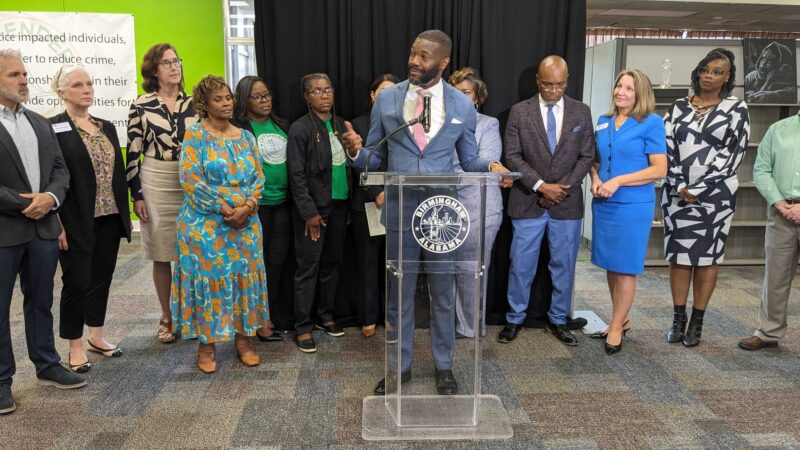Alabama Immigration Law Settlement
Civil and immigration rights groups in Alabama are cheering after the state agreed Tuesday to settle three lawsuits challenging HB 56, the state’s controversial illegal immigration law. The move caps two years of legal battles and comes after the U.S. Supreme Court denied Alabama’s appeal to restore parts of the law.
Alabama’s illegal immigration law was known as the toughest in the nation. Previous court rulings had already temporarily blocked many provisions of the law, and, if this agreement is approved in federal court, the law will have permanently lost some teeth.
“You need not be an undocumented immigrant to see this resolution of the lawsuit as a very positive step for all Alabamians,” said Cecillia Wang of the American Civil Liberties Union, one of the groups that sued over the law. “There are so many civil rights violations that would flow from this sort of state anti-immigrant law that it’s truly a victory.”
The Alabama law included a wide variety of provisions critics say were designed as “self-deportation policies” for undocumented immigrants. These ranged from criminalizing the solicitation of work to making it a crime to provide transportation to any undocumented individual.
It also included provisions unique to Alabama, including voiding contracts if one of the parties involved was an undocumented immigrant, and requiring public schools to check the immigration status of newly-enrolled students.
Since many undocumented people have children who are U.S. citizens, “the prospect of verifying and asking questions about immigration status in the school setting was an extreme deterrent to these children trying to access an education,” said Kristi Graunke, an attorney at the Southern Poverty Law Center, another group involved with the challenges to HB 56.
Since the the law went into effect, Graunke says the SPLC has also seen undocumented immigrants unable to establish utility service and suffering from wage theft.
The proposed settlement agreement also addresses HB 56’s show-me-your-papers provisions.
“The state has agreed with the plaintiffs in these cases that the show me your papers provisions do not authorize any police officer or sheriff’s deputy in the state of Alabama to detain people on suspicions of immigration violations,” said Wang. She believes the repercussions will be wide-reaching in Alabama.
“This is a really significant victory because the Attorney General’s acknowledgement that any such detention would violate the Constitution is going to be key in protecting communities around the state,” Wang said.
Reaction from Alabama officials was muted. In a statement, Alabama House of Representatives majority leader Micky Hammon, one of the original sponsors of the law, said the settlement was a “great victory.”
That’s because much of the law is still intact. One element the settlement didn’t address is a provision blocking undocumented students from attending public colleges and universities. Victor Cuicahua is an undocumented student at the University of Alabama in Tuscaloosa. He found the settlement disappointing.
“I thought of all the other undocumented kids that I’ve met that had wanted to go to university, but were unable to do so. And I thought, with this settlement, a lot of the doors for them in Alabama are closed,” said Cuicahua.
A federal judge is expected to rule on the settlement in the next few weeks.
~ Rachel Osier Lindley, October 30, 2013
New pilot program will offer housing, resources to people leaving prison
The Birmingham Reentry Alliance will provide wrap around services to dozens of men and women adjusting to life after prison.
A New Orleans garden paid hundreds of dollars in fees for a sewer that doesn’t exist
Galvez Garden owner Lissie Stewart has been fighting the New Orleans Sewerage and Water Board over inaccurate billing for years.
Alabama coal mine keeps digging after hundreds of fines and a fatal explosion
Following the death of a grandfather, Crimson Oak Grove Resources has left a community afraid for their homes and lives. An expert warns one resident may need to evacuate her home while she still can.
Florida’s 6-week abortion ban will have a ‘snowball effect’ on residents across the South
Abortion rights advocates say the ban will likely force many to travel farther for abortion care and endure pregnancy and childbirth against their will.
Attitudes among Alabama lawmakers softening on Medicaid expansion
Alabama is one of ten states which has not expanded Medicaid. Republican leaders have pushed back against the idea for years.
Birmingham is 3rd worst in the Southeast for ozone pollution, new report says
The American Lung Association's "State of the Air" report shows some metro areas in the Gulf States continue to have poor air quality.







